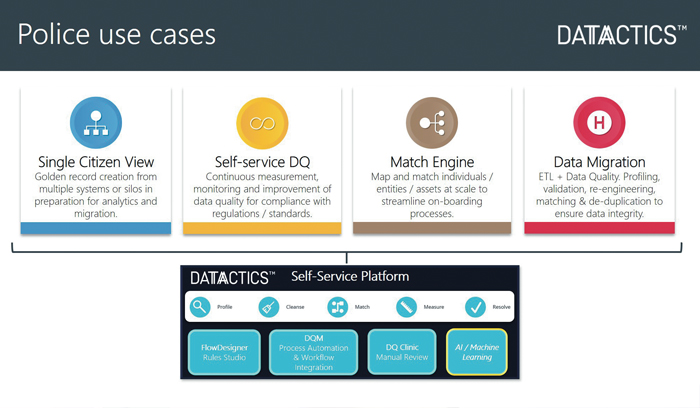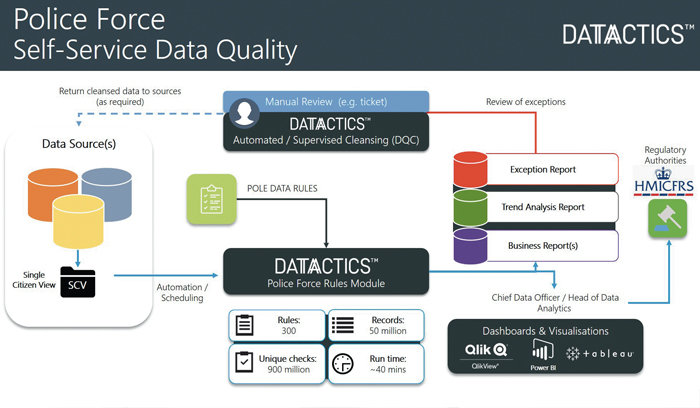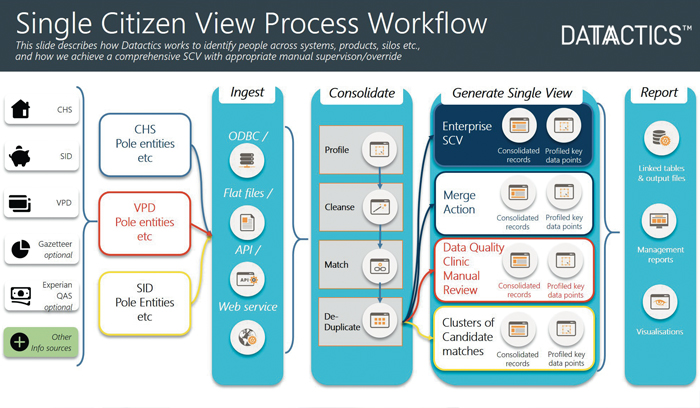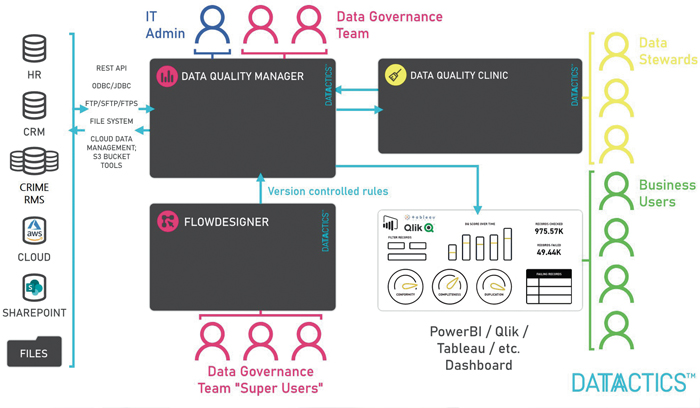Data quality improvement
Start small, think big
Like the weather in Britain, poor data quality is often seen as an intractable problem. Why should that be the case? At Datactics our experience, in a range of complex data challenges for highly regulated industries such as banking and government, is that with the correct combination of tooling and an intelligent approach to governance, data quality improvement can be achieved in a fast, iterative and cost-efficient way.
Data-driven policing: a new imperative
Increasingly, police forces are being challenged to improve data analysis and insight. They require tools that assist with data preparation and data wrangling to provide clean, de-duplicated and well-structured information to multiple critical business functions. These include upstream analytics software, such as PowerBI Dashboards for management reporting, data science tools such as MatLab or R supporting predictions on crime trend demographics, and internal reporting to better interrogate the reserves of crime data they hold.
In their forward to the National Police Chiefs’ Council’s (NPCC) ‘Digital, Data and Technology Strategy 2020-2030’, the heads of the NPCC, the Information Management and Operational Requirements Coordination Committee (IMORCC) and the Association of Police and Crime Commissioners (APCC) stress that information is the life-blood of police forces and highlight the challenge of dealing with the data that will support intelligence-led policing in the next decade.
Police forces across the UK will face many demands in relation to the volumes and types of information related to increasingly sophisticated crimes. Simultaneously, police data stewards will meet increasing demands for transparency and accountability regarding their decision-making based on this data.
Constabularies currently face many challenges arising from the very large volumes of potentially messy information relating to people, objects, locations and events (‘POLE’ data). Poor data quality, limited data standardisation, validation failures and data duplication all get in the way of effective incident analysis and reporting. Police officers spend too long retrieving data from silos and reconciling it before it can become actionable intelligence. Poor data quality can also create downstream problems for citizens and regulators as they conclude that an organisation’s data sometimes cannot be trusted.
In the 2020 RUSI Annual Security lecture, the Commissioner of the Metropolitan Police Service, Dame Cressida Dick, asked her audience to take away the following message: “Policing will remain an essentially human service, supported by better information and tools.” The key message of these recent reports is that police forces should aim to unlock the power of data and put actionable information in the hands of officers and staff when it is needed. The key to the success of future policing will be to provide frontline staff with up-to-date and accurate insights from many disparate sources of data.
In addition, Dame Cressida referenced RUSI’s Data Analytics and Algorithms – towards a new policy framework. The report makes strong recommendations to government, regulators, police forces and software developers, especially on meeting society’s expectation about how we handle citizen information in the challenging new world of artificial intelligence (AI)/machine learning.
People, processes, and platform: the holy trinity of data quality
What part does improving data quality play in all of this? In this article we discuss how improvements in data quality involving people, platforms and processes can assist in generating better data to feed the major information processes used in policing. We suggest an agile approach that looks to augment existing reference data systems with compact and affordable tooling to measure and improve data quality as well as matching.
We also discuss the essential data quality personnel roles required to make such tools effective and propose a range of practical use cases that might be attempted by any force.
In our experience, successful data leaders should measure quality, create and staff key roles, pay attention to tooling costs and explore the art of the possible via a well-defined proof of concept (POC) where the client can easily demonstrate the benefits to their business. Ideally, this POC would start small and then be used to evaluate the costs and benefits of a broader data quality programme, while simultaneously building stakeholder confidence. A successful POC should result in realistic timescales for a broader project and provide measurable indicators for the value of data quality improvements.
From our experience in delivering such programmes, we see the following potential use cases where measuring and improving data quality can be used to improve operational excellence in policing.

Use case 1 – Self-Service DQ for data quality metrics and improvement
It is a fundamental tenet of engineering that “you can’t manage what you can’t measure”. Self-Service Data Quality allows for the continuous measurement and monitoring of live police data assets according to recent POLE and Management of Police Information (MoPI) standards. Data sources could be many and various, including record management systems (RMS) and POLE data stores and holding information related to crimes, custodies, intelligence, case preparation and regulatory reporting. Business users are typically interested in data quality metrics such as consistency, validity and completeness. Rules relating to these data sets could start with simple accuracy checks (eg, does a postcode have a correct format, or is a suspect’s age between certain limits) and then build to more complex logic involving gazetteer data where an address can be checked against a postcode or geographic information system (GIS) reference. The system has a range of connectivity options for third-party sources of validation information relating to name and address, including open data from Post Office postcode address file (PAF) and Gazetteers for GIS.
Metrics showing the improvement or degradation of data quality over time are available for review by data stewards via an easy-to-use dashboard and allow drill-down to failing records for correction if required. The Datactics system is designed to be operated by subject matter experts (SMEs) who can fine tune out-of-the-box rules without needing to be a programmer or coder. These SMEs can be force data analysts or external consultants, depending on whatever approach the force requires. Ultimately, the purpose of Self-Service Data Quality is to allow end users to monitor and maintain high-quality data that is accurate, consistent and fit for purpose.

Use case 2 – Creating a single citizen view
Forces should assess the benefits of improved data quality in regard to the duplication of police nominal data to create a ‘single citizen view’. Much like in banking and finance, where being able to see one consolidated view of a customer makes for better intelligence, marketing and regulatory reporting, this will vastly improve the activities that police forces can undertake based on better quality data. It would enable forces to meet regulatory reporting for General Data Protection Regulation (GDPR), or to provide clean data into software used for predictive analytics, which might otherwise be made less accurate by ‘noisy’ data, for example containing duplicate nominals.
Creation of a single citizen view has several prerequisites. Firstly, it involves powerful matching on large data sets and de-duplication logic that allows for highly configurable fuzzy matching on name and address information. Secondly, the output needs to be one single golden record or a cluster of candidate records scored for how closely they match (known as a likely match rate). This process should not discard any previous metadata that can be used to understand the history of the person in question.
Additionally, matching should deal with issues regarding data falsification, where a suspect may provide inaccurate information to avoid detection. Challenges in this area include suspects deliberately obfuscating names via abbreviations and transpositions, as well as having to deal with multiple languages such as Chinese, Japanese, or Cyrillic scripts.

Use case 3 – Data migration using the Datactics platform
Many forces are modernising core technology. They are involved in the migration of data from legacy systems to next-generation solutions, often for crime record management, while aligning themselves with a national vision for police data and technology.
Historically, these legacy systems contain large volumes of duplicated or incorrect information relating to crimes, custodies, cases, vehicle defect rectification schemes and Home Office Road Traffic (HORT). Ideally, data migration involves not just data transfer but allows for ‘Extract, Transform, Load (ETL) plus data improvement’ as part of the operation. This will result in the new target system being populated with scrubbed and de-duplicated data and operating at a higher level of accuracy due to improved data quality.

Conclusion: Start small, but make a start
In the conclusion of National Policing Digital Strategy, the authors outline a “big picture” where data-driven insight has the possibility of being a “force multiplier” in terms of the contributions from multiple data sets, and the pace, predictability and precision of police work. They go on to emphasise the potential of big data and AI as game-changers for policing in the next decade. All these technologies require high-quality data that is clean, complete and de-duplicated, measured to a high standard and monitored over time.
Taking a first step with Datactics builds on our work already completed in the sector and within other highly regulated domains such as financial services and insurance.
Demanding better data to power excellence in policing is the perfect place to begin.
Email: info@datactics.com
Tel: +44 (0)28 9023 3900



